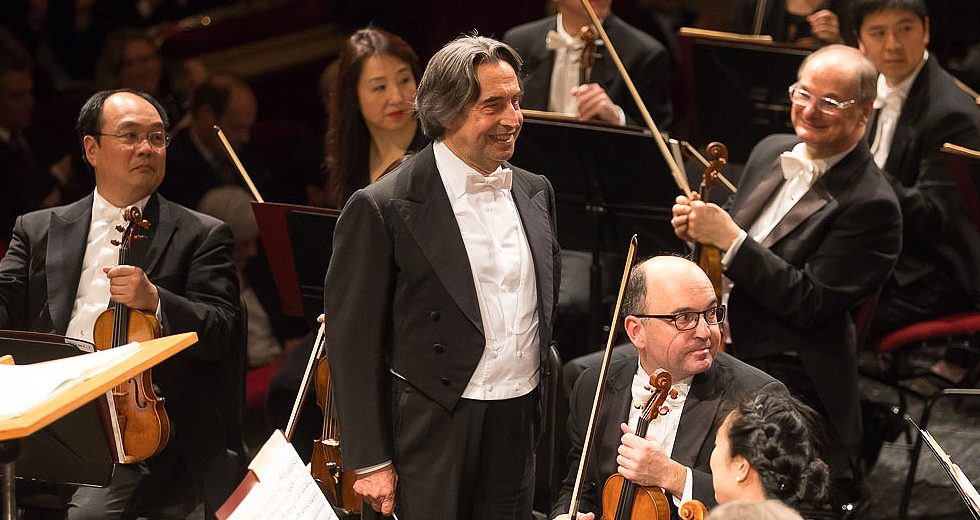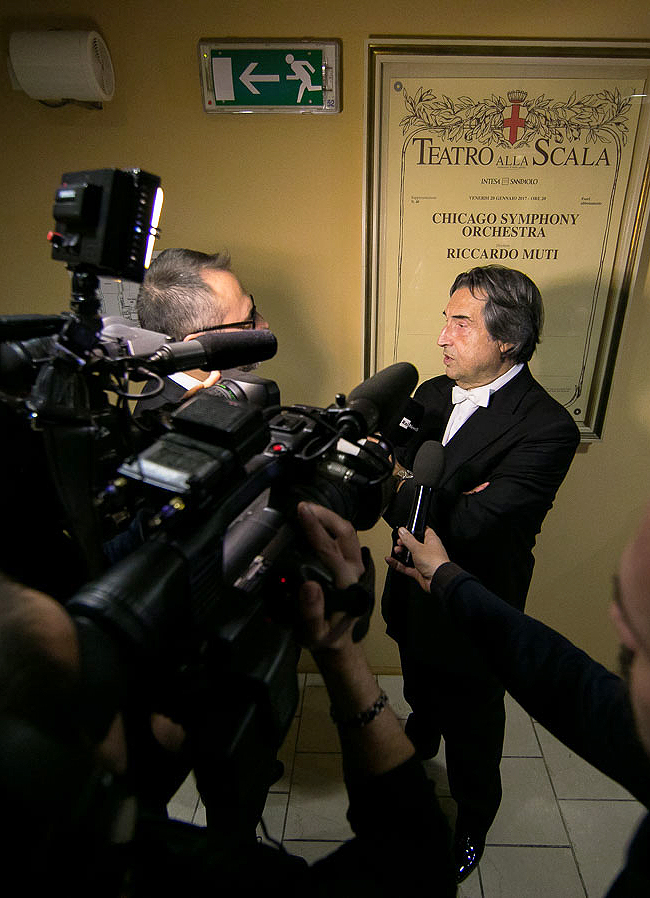
MILAN — Riccardo Muti was serious. Standing on the podium at the Teatro alla Scala, where he had not performed in a dozen years after serving for two decades as artistic leader of this, the world’s most famous opera house, he reminded the packed audience there to hear the Chicago Symphony Orchestra that this was the domain of Verdi. A single clarion voice, just as serious and just as proud, shot back in Italian: “And of Muti.”
Whatever the deep and complicated artistic differences that led to Muti’s exit in 2005, this vociferous throng now welcomed him back as family. They roared their affection for him, just as they cheered and whooped for the orchestra he had brought back into their midst for its first visit in 36 years — when Georg Solti presided over some of these same virtuosi.
Among the returnees was David Taylor, CSO assistant concertmaster, who admitted the passage of time had dimmed his recollection of that earlier experience even as he exuded over the welcome the CSO received on this tour and the supreme effort the band was making on Muti’s behalf in these two concerts. “We always give him a hundred percent, as he does for us,” said Taylor, “but being here at La Scala is special. I think we’re all trying to push it to 110 percent.”

After the first concert at La Scala, Riccardo Muti fields questions from the press. | © Todd Rosenberg Photography 2017
Was it also special for Muti? That was the question on everyone’s lips in musical Italy. Backstage after the first of the La Scala concerts, television interviewers wanted to know. The same eager query came from the editor of Corriere della Sera, one of Italy’s largest newspapers and sponsor of a projected series of 20 CDs and DVDs commemorating Muti’s 20 years at La Scala’s helm. Actually, the typical lead-off question was two-fold: How did it feel to be back, and was there any hope that Muti would return to conduct opera again at La Scala?
Muti addressed both questions at length in an interview with this writer, before plunging into that feverish milieu in Milan, back in the blissful quiet of the touring CSO’s prior stop in Aalborg, Denmark. What was special about his La Scala return, he said, was the prospect of sharing this magnificent orchestra with a discerning audience known for making its opinions abundantly, sometimes brutally, clear. As for his conducting opera again at La Scala, well, that was complicated.
“I conducted 50 operas at La Scala, from Pergolesi to Stravinsky,” Muti recalled by way of framing what befell a dozen years ago and what might yet be possible. “In the end, we had artistic differences that could not be resolved, and I resigned.”
But then the maestro got that mischievous gleam in his eye, a smile broke out and this man who might have made a career in stand-up comedy continued: “I just resigned once. Toscanini resigned three times. I think I’m too old to match him. But there’s always something at La Scala. Verdi had a big fight there and stopped writing operas [for the company] for many years. De Sabata had a heart attack there, and Mitropoulos died on the podium. It’s a tradition!”
Muti also acknowledged that audiences at La Scala can be hostile toward conductors and singers alike. “When Karajan conducted La traviata there with Mirella Freni, the boos and whistles [a more piercing form of booing in Europe] were so loud that he had to leave the theater through the back door. Now it is better because there are so many tourists from Japan and Korea who are just happy to be there.”
But not even a kinder, gentler public may draw Muti back to La Scala to conduct opera. “I’m not exactly unemployed,” he said with a touch of sarcasm, “and preparing an opera the way I insist on doing it is time-consuming. I’m not talking about three rehearsals. I demand almost two months — almost one month to work with the singers first. For me to find that much free time is not easy. I don’t say it will never happen, but we will see. My first obligation is to Chicago.”
Muti’s Chicagoans played seven works in two nights at La Scala, and the exuberant responses were hardly less fiery than those 110 percent performances. It was quite a remarkable scene: elegantly attired listeners, men and women alike, comfortably at home in their historic opera house with its six horseshoe tiers and dazzling red, white and gold décor, erupting into frenetic ovations time and again, raining bravos and flowers on orchestra and conductor. It was a genuine love fest.
As Muti quieted the crowd to introduce an encore, the overture to Verdi’s opera Nabucco, a female voice cried out from a seat near the podium, “Bravo, Maestro!” Locating the source of that salute, the conductor replied with a broad grin and affectionate needling, like a fond youth to an aunt of a certain age, “You are still coming to concerts?”
To which the woman answered: “I am older than you, Maestro!”
Muti translated that exchange for me backstage after the concert. He was happy, a favorite son basking in the warmth of home and family. Like that distant other time was yesterday.
Lawrence B. Johnson is editor of the performing arts web magazine Chicago On the Aisle.